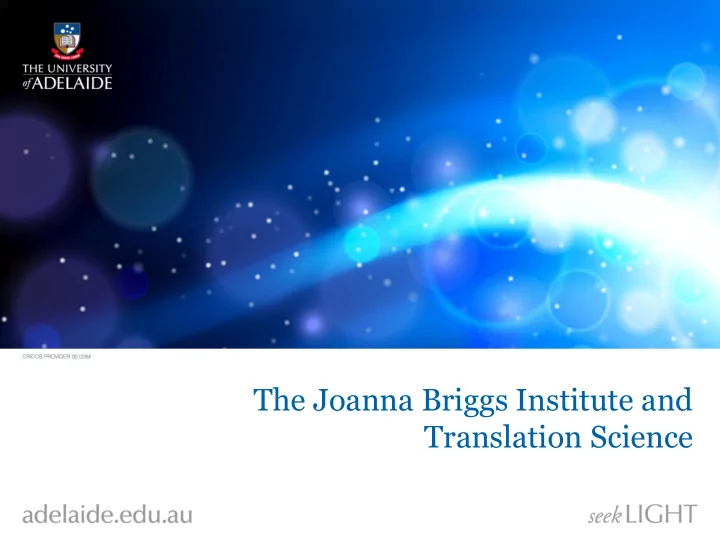

The Joanna Briggs Institute and Translation Science
Overview • Evidence based healthcare • Translational science (TS) • TS in Australia and internationally • The JBI approach to TS • TS in the FHS • TS and postgraduate study • TS education into the future
Evidence based healthcare • ‘ the conscientious, explicit, and judicious use of current best evidence in making decisions about the care of individual patients. Evidence-based clinical practice requires integration of individual clinical expertise and patient preferences with the best available external clinical evidence from systematic research and consideration of available resources ’ (Guyatt et al. 2008:783)
Translation science • Translational research is frequently referred to as the “bench -to- bedside” enterprise of harnessing knowledge from basic sciences to produce new drugs, devices, and treatment options for patients
Australia’s Chief Scientist Professor Ian Chubb (2012): “ Every time a researcher receives funding for a study into a certain gene, or a protein, there is an underlying hope that it will matter in a big way. That it will change the way we treat patients. That it will improve the health of our citizens. It is not necessarily about making money and filing patents, although they help, but most taxpayers want to see results that will help them and their loved ones. ”
A tale of two cities • Australia is producing more high quality primary research than ever before: “an avalanche of outstanding research”; “medical journals are choked with quality science” • Paradoxically, research advances (in quality and quantity) have not led to a marked increase in new cures. Much of what we now use to treat many common ailments is based on research from years ago.
Two examples • Depression: Australia alone has spent $140 million on scientific research into depression in the last 10 years. Most patients still treated with serotonin reuptake inhibitors (based on scientific principle from 1961). • Obesity: Australia has spent almost $200 million on research (genetics, basic biology and food regulation) and yet such new knowledge has not been translated into a decrease of overweight/obesity in the community... 3 in 5 people overweight or obese (that’s over 12 million people) – 5% more today than in 1995.
TS in Australia • NHMRC Research Translation Faculty - launched in 2012 as a major strategic initiative for health and medical research translation in Australia • 2,800 members made up of NHMRC supported CI’s and NHMRC Fellows • Key advisory forum to directly help NHMRC confront key challenges and support accelerated translation into policy and practice • Addressing gaps and building a Case for Action (at patient, population and system wide levels) • Advanced Health Research and Translation Centres
TS in the United States • National Institutes of Health (NIH) – major push to fund translational medicine (biomedical focus and cross functional collaboration between researchers and clinicians) • The National Centre for Advancing Translational Science (NCATS) established within NIH to “transform the translational science process so that new treatments and cures for disease can be delivered to patients faster” • The Clinical and Translational Science Awards – established in 2006 supports 60 centres across the country that provide “academic homes for translational sciences and supporting research resources needed by local and national research communities”
TS in the United Kingdom • National Institute for Health Research (NIHR) Translational Research Partnerships (TRPs): facilitate collaborative efforts between the NHS, university clinical researchers and life science companies in designated fields of interest (largely biomedical/early stage research)
Models, Frameworks and Gaps • The need to improve the translation of basic and fundamental research findings into routine clinical practice was one of the main observations of the ‘Review of UK Health Research Funding’ (Cooksey, 2006) and this review identified two contributory problems: – The first is the gap between the description of a new clinical intervention and initial clinical trials (sometimes referred to as the first translation gap, or T1) – The second is the gap between evaluation of new interventions in health technology assessment studies and the embedding of the new intervention in clinical practice (referred to as the second translation gap, or T2)
Canadian Institute’s of Health Research
Cancer Institute of NSW
SAHMRI
JBI suggest three translational gaps Clinical/Policy Clinical Discovery Gap 2 Gap 3 Action Application Gap 1 Unmet need for Knowledge
Translation science in the FHS
Emerging FHS framework for TS
Scope of TS activity • Encompasses all types of primary research (discovery, pre-clinical, clinical, epidemiology, population health, health services research) • Utilizes secondary research (i.e. systematic reviews/evidence synthesis) • Requires effective stakeholder engagement in a series of structured and iterative encounters
TS and postgraduate study • Monash University – PhD and Grad Cert in Translational Research (to be launched in 2015) Harvard University – Postgraduate Education Program in • Clinical and Translational Science (Masters and PhD) University of Edinburgh – MSc in Translational Medicine • • Imperial College London, University College London, Oxford and Cambridge Universities run post graduate courses in Translational Medicine • UCSF, Berkley, University of Helsinki, Aalborg University Denmark, Cedars-Sinai Medical Centre (LA) and many more! • NB – no undergraduate programs!
JBI and TS for Masters and PhD • Focus on “evidence synthesis”, “evidence transfer” and “evidence implementation” • Moving beyond disciplinary boundaries and siloes and promoting effective collaborative interactions • Overcoming disconnects between academia and practice
TS education into the future • A truly multi-, trans-disciplinary approach (across medicine, nursing, public health, medical science, allied health and social science) at undergraduate AND postgraduate level) • Focus on the full trajectory of translation (knowledge scoping, evidence identification, evidence appraisal, evidence synthesis, situational assessment/audit, implementation and evaluation of impact) to translate evidence into action at the health policy, health services and health practices level
Recommend
More recommend